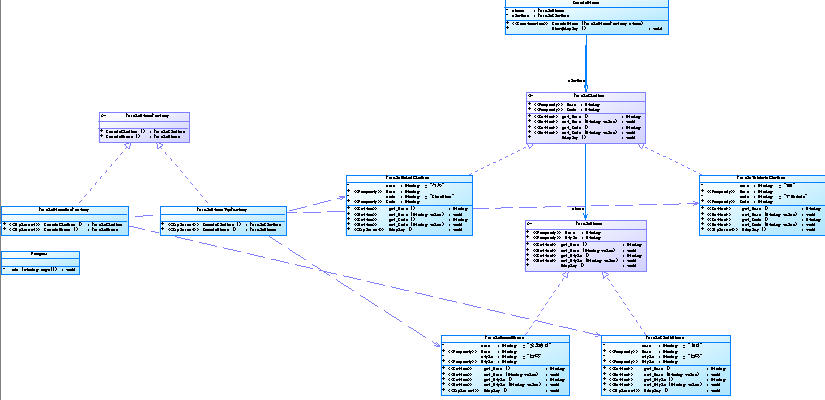抽象工厂 学习手记
概述:
提供一个创建一系列相关或相互依赖对象的接口,而无需指定它们具体的类。
模型图:

代码二个抽象接口:
internal interface FemaleShoes
{
String Name { get; set; }
String Style { get; set; }
void Display();
}
internal interface FemaleClothes
{
String Name { get; set; }
String Code { get; set; }
void Display();
}
具体实现类:
internal class FemaleClothShoes:FemaleShoes
{
private String name="布鞋";
public String Name
{
get { return name="布鞋"; }
set { name="布鞋" ; }
}
private String style="均码";
public String Style
{
get { return style="均码"; }
set { style="均码"; }
}
public void Display()
{
Console.WriteLine("鞋子名称:"+Name+" 款式:"+Style);
}
}
{
private String name="布鞋";
public String Name
{
get { return name="布鞋"; }
set { name="布鞋" ; }
}
private String style="均码";
public String Style
{
get { return style="均码"; }
set { style="均码"; }
}
public void Display()
{
Console.WriteLine("鞋子名称:"+Name+" 款式:"+Style);
}
}
internal class FemaleBoardShoes : FemaleShoes
{
private String name = "女装板鞋";
public String Name
{
get { return name = "女装板鞋"; }
set { name = "女装板鞋"; }
}
private String style = "均码";
public String Style
{
get { return style = "均码"; }
set { style = "均码"; }
}
public void Display()
{
Console.WriteLine("鞋子名称:" + Name + " 款式:" + Style);
}
}
抽象工厂接口:
internal interface FemaleStoreFactory
{
FemaleClothes CreateClothes();
FemaleShoes CreateShoes();
}
{
FemaleClothes CreateClothes();
FemaleShoes CreateShoes();
}
具体工厂类A:
internal class FemaleStoreOneFactory : FemaleStoreFactory
{
public FemaleClothes CreateClothes()
{
return new FemaleShirtClothes();
}
public FemaleShoes CreateShoes()
{
return new FemaleClothShoes();
}
}
{
public FemaleClothes CreateClothes()
{
return new FemaleShirtClothes();
}
public FemaleShoes CreateShoes()
{
return new FemaleClothShoes();
}
}
具体工厂类B:
internal class FemaleStoreTwoFactory:FemaleStoreFactory
{
public FemaleClothes CreateClothes()
{
return new FemaleTshirtsClothes();
}
public FemaleShoes CreateShoes()
{
return new FemaleBoardShoes();
}
}
{
public FemaleClothes CreateClothes()
{
return new FemaleTshirtsClothes();
}
public FemaleShoes CreateShoes()
{
return new FemaleBoardShoes();
}
}
实现实例化的类
internal class CreateStore
{
private FemaleShoes shoes;
private FemaleClothes clothes;
public CreateStore(FemaleStoreFactory store){
shoes = store.CreateShoes();
clothes = store.CreateClothes();
}
public void ShowDisplay()
{
shoes.Display();
clothes.Display();
}
}
{
private FemaleShoes shoes;
private FemaleClothes clothes;
public CreateStore(FemaleStoreFactory store){
shoes = store.CreateShoes();
clothes = store.CreateClothes();
}
public void ShowDisplay()
{
shoes.Display();
clothes.Display();
}
}
客户端:
class Program
{
static void Main(string[] args)
{
CreateStore store = new CreateStore(new FemaleStoreOneFactory());
store.ShowDisplay();
Console.ReadLine();
}
}
{
static void Main(string[] args)
{
CreateStore store = new CreateStore(new FemaleStoreOneFactory());
store.ShowDisplay();
Console.ReadLine();
}
}
抽象工厂模式分离了具体的类,同时克服“开放-关闭”原则。抽象工厂模式通过接口实现了产品的分离,由工厂封装创建产品,使得他们不会出现在客户代码中。


